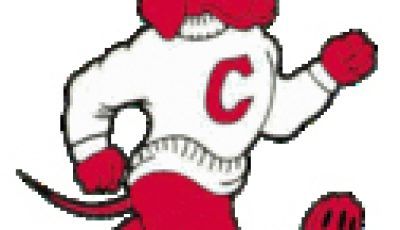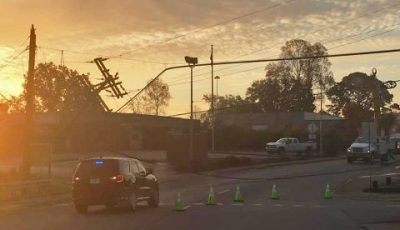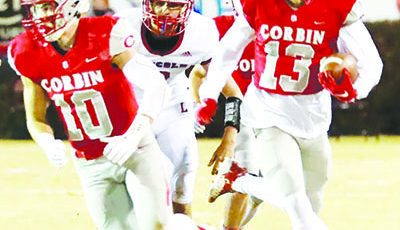Greer recognized by board for ‘Principal of the Year’ honors

Corbin Educational Center Principal Tommy Greer speaking at a recent meeting of the Corbin Independent Schools Board of Education.
The Corbin Board of Education recognized one of its school leaders Thursday for earning, “Principal of the Year” honors.
Tom Greer, principal at the Corbin Educational Center received the award during the Kentucky Alternative Education Summit in Lexington in July.
“That is not something you should take lightly, Tom, because that is a really big honor and we are really proud of you,” said Board Chair Kim Croley during the board’s special called meeting.
“This is not a surprise,” said Superintendent Dave Cox noting that auditors speak highly of the school and what Greer and his staff have accomplished.
“He tells me they are one of the leading schools in the state,” Cox said of his conversation with the auditor.
Greer said like when any other administrator receives and award, the praise should go to the staff.
“From the mental health counselors, teachers, to our instructional assistants, they do a wonderful job. They deserve all of the credit,” Greer said. “They love kids.”
Cox said unlike what people may believe, the educational center results in fewer situations requiring central office involvement than most of the others.
“It is well run and well taken care of,” Cox said of the educational center. “Your staff does a great job. Thank you, and thank them for us.”
The new school year marks Greer’s seventh as principal at the educational center.
The school serves up to 55 students in grades 4-12 from Corbin Independent, Williamsburg Independent and Whitley County School Systems.
“We are a day-treatment program. What that means is that the students are usually having some mental health issues. That is really the meat and potatoes of the program.”
“Our goal is, whatever the issue is, to get that under control. Give the students someone they can talk to with the counselors.”
In addition to class work, Greer said the students participate in individual and group counseling.
Students may be court-ordered through juvenile court, in the foster care system through the Kentucky Department for Community Based Services. In addition, high school students may voluntarily attend the program if it is deemed they may benefit from mental health counseling while continuing to attend school.
Greer said the program is typically 16 to 18 weeks.
“A lot of that really depends on the mental health state of the child. We have had students for up to two years,” Greer said.
Greer said prior to instituting this program in 1997, students facing such issues may have had a few minutes conversation reaching out to a teacher, coach or guidance counselor.
“They would have just been expected to battle through it,” Greer said.
“People don’t understand what parents going through a divorce does to a child. It turns their world upside down. They have got to be able to talk to somebody,” Greer said adding that at a traditional school a mental health counselor may have as many as 80 students where the educational center’s six counselors will have less than 10.
“Before that student is really going to open up with you, you have got to build a relationship. I think our biggest plus here is that our counselors and teachers do a wonderful job in building that relationship with that child. Then they really open up and share what is really going on and what is causing them to have these issues,” he said.
Greer said there is a difference between an alternative school and a day treatment program.
“Most alternative schools are credit recovery programs,” Greer explained.
Funding for the school comes through the Kentucky Educational Collaborate for State Agency, Department of Juvenile Justice, and state funding.
Greer said if, for whatever reason, a student refuses to work with the program, there are several options, depending on how the student came to be at the school.
“If they are court ordered, we will get them back before the judge. There are all types of residential facilities that students may be sent to,” Greer said.
Greer said it is ultimately up to the teacher and the counselor to say when a student may be ready to return to a traditional classroom.
“The mental health counselor has fifty percent say. The teacher has fifty percent say,” Greer explained. “If one says the student is not ready, then we will keep them a little bit longer.”
Greer said after the student returns to school, the mental health counselors remain in contact with the students and the parents to ensure everything is still going well.
“We are required to do that for 45 days. But I can tell you that it is not a surprise to see, 60, 90 days, they are still in contact,” Greer said.
Greer said former students frequently return during the group counseling sessions to share their stories with the current students and show them what is possible.
“Most of the time the students enjoy that as much as anything,” Greer said.
Despite what the public may believe, Greer said his staff has remained essentially the same during his tenure.
“I think the folks that are in here are very passionate about young people. Our mental health and educational staff are both outstanding.”
“No matter where you are at, if you love kids and will build a relationship with kids, they’ll go a million miles with you,” Greer said.








